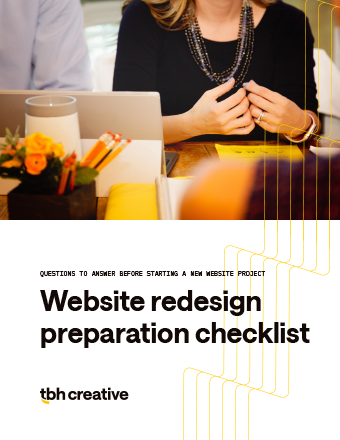Asking the right questions to set smart website goals

With every new website project, TBH Creative creating a project foundation by asking questions, such as:
- What is the top way your website can support business success?
- Who is the target audience for your new website?
- What sets you apart from your competitors?
What is the top way your website can support business success?
Depending on your industry, the role your website plays within your company may vary. Hospital websites are often used as a tool to collect appointment requests whereas ecommerce stores usually use their websites to grow purchase orders.Here are some common types of goals for a website. Which seems most useful to your company?
Informational/educational website goals
This type of website goal is best suited for companies and organizations that don’t use their sites to sell products or collect contact information. Appropriate goals for informational/educational websites might include engagement-focused metrics, including average time on site, bounce rate, and number of pages/session.
- Is your main goal to educate users about your industry, product, or service?
- How would a more professional website help your business better represent its brand online?
The vast majority of TBH Creative’s clients fall into this bucket because their top goal is to create a new website that helps their business convert website visitors into contacts using online forms, content offers, email subscribe lists, and more. These goals can be monitored by measuring the number of form submissions and tracking conversion rates.
- Do you offer discounts or promotions to email list subscribers?
- Are you set up to have your sales team work leads submitted through your website’s forms?
- Does your digital marketing plan include nurturing techniques to help users through the buyer’s journey?
If you have an online store, this is likely the goal that will make the most sense for your company. Once you have a new website design centered around driving more conversions (or increasing purchases), you can measure by metrics like number of purchases, product page views, and new vs. returning users to track success.
- Do you have an online store that is hosted on (or linked to) your website?
- Is it easy for your customers to find reviews, product details, and purchasing information on your website?

Download now
Who is the target audience for your new website?
Many people get stuck on this question when planning their new website since nearly all businesses have multiple audiences they want to reach. Everyone wants to reach everyone. To plan a successful new website project, though, you’ll want to think about which audience target is most likely to complete the action you’re hoping for on the website.In healthcare, for example, we’ve often found that wives and moms tend to be the household members most likely to book appointments, look up directions to clinics or hospital locations, and pay medical bills online. While you don’t want to exclude any audiences, focusing on the needs of the group that is most likely to engage with your website can help you make smart decisions on your new website.
Questions to ask to learn more about your target audience
- Of all the people you are trying to reach, which group is most likely to use the website to book appointments, schedule product demos, arrange consultations, or make purchases?
- Are members of this audience more likely to use a desktop, smartphone, or tablet to interact with your website?
- Do they tend to be more active on certain social media platforms than others?
- Based on your industry and services, is your audience target looking for competent yet friendly advice, straightforward and scientific data or something else?
What sets you apart from your competitors?
This may not seem like an intuitive inclusion in website planning, but many companies find that identifying their differentiators is a helpful part of project foundation planning.In addition to knowing what you want your website to do and who the primary audience target is, your new website design should take into consideration what those users will get from your company that they can’t get from other vendors or service providers. Avoid miscommunication and set yourself up for success by putting down in writing what those differentiators are.
Differentiators may include:
- attentive support staff,
- new technologies and tools not offered anywhere else,
- ease of use or convenience, and
- turnkey reporting.
Planning ahead: Track current website data to set a baseline
In the marketing industry, we have our own set of adages, and many of them are related to measuring and tracking data. Here are a couple of examples:“If you are not measuring, you are not marketing.”
“What you can’t measure, you can’t improve.”
Data is the final piece to the website project foundation puzzle. Before beginning a new website design, you should know how your current website is performing. These will be the benchmarks to determine if the new website is ultimately successful based on your project goals.
While the website data that will help you best determine success may vary, a few common examples include:
- Total sessions
- Bounce rate
- % new users
- Desktop vs. mobile views
- Landing pages/entrances
- Exit pages
- Most visited pages
See our complete guide to a successful website redesign project
You might also like
- How to write a website design RFP that saves time and gets better results
- How to evaluate examples of web design packages
- How to effectively audit an underperforming web page

About the author TBH Creative
TBH Creative is an award-winning marketing company specializing in web design/development, digital strategy, inbound marketing, and reporting. Since 2004, we’ve built multi-dimensional digital marketing campaigns and complex, enterprise-level websites for clients in a wide range of industries.
We believe in communicating clearly, delivering excellence, and beating deadlines. But beyond those ideals, what really drives the heart of our business is your business—helping our clients achieve more with comprehensive digital marketing and web design.
Our Indianapolis web design company is WBE-certified in the state of Indiana and the city of Indianapolis, and we’re also a Hubspot-certified inbound marketing agency.